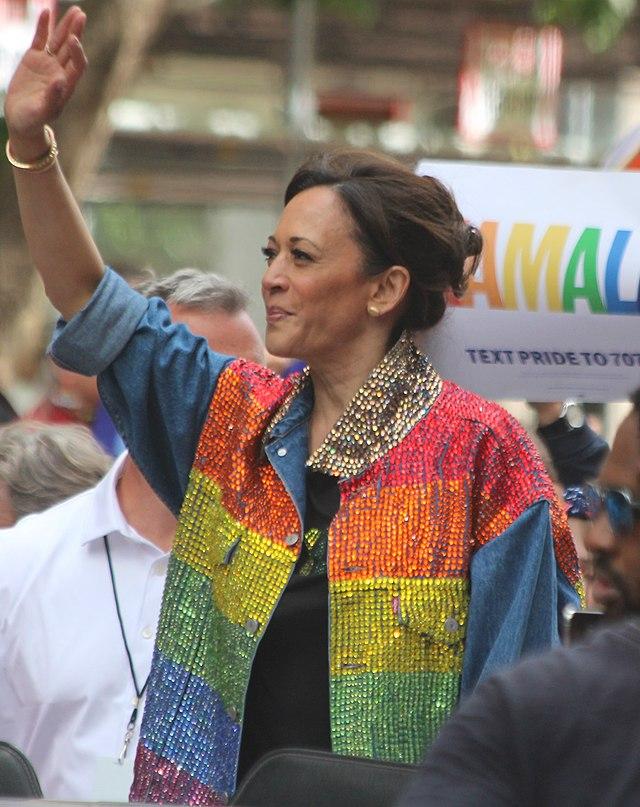I guess I live under a rock in the podcast world. Until last week, I had only heard of Alex Cooper’s ultra-famous show “Call Her Daddy” in passing, until I discovered that Vice President and current presidential candidate Kamala Harris was set to appear for a 40-minute sit-down interview with Cooper. Fabulous, I thought sarcastically. That’s just what we need three weeks before, arguably, the most important American election of the century: more politicians hitting the podcast studios.
And yet, maybe that is what we need. When “Call Her Daddy” host Alex Cooper sat down with Harris in a Washington D.C. hotel in September –– the room decorated in imitation of Cooper’s real podcast set in Los Angeles –– Harris wasn’t there to give a traditional campaign stump speech. She was there with the intent to reach new ears; primarily those of women from all sides of the political spectrum, who tune in millions to “Call Her Daddy” every week for conversations typically devoid of political themes.
“I want ‘Call Her Daddy’ to be a place where everyone feels comfortable tuning in,” stated Cooper before introducing Harris to the episode, released on Oct. 6. “I do not usually discuss politics or have politicians on this show.”
With a primarily-female listenership and an advertising statement fit perfectly to match (“the most-listened to podcast by women”), “Call Her Daddy” has become an outlet for Cooper to intimately discuss culture, sex and relationships with predominantly female guests.
Those topics, of course, are political, but as Cooper explains, “Call Her Daddy” rarely if ever looks through a lens of partisan politics. But as Americans prepare for an election where the reproductive rights of millions of women hang on the line, Cooper’s podcast –– listened to by many of said women –– could provide a space to address those issues head-on. They’re already on the ballot. Why can’t they take up space in more ‘casual’ media outlets like podcasts, too?
Cooper’s interview with Harris was no hard-hitting accountability interview, and certainly not an endorsement, but it didn’t need to be. In the span of their time together, Cooper and Harris –– occasionally trading stories about their own mothers and important women in their lives –– created a substantial and highly relevant conversation about women’s rights, women’s safety and security, and the importance of voting for, rather than only against, something in 2024.
As a presidential candidate, Harris appeals to women in the United States who value bodily autonomy, personal freedom, and the importance of, as she said, “lifting each other up.” Her commitment to restoring the protections once offered by Roe v. Wade, as well as newly-released policy plans aimed at supporting young families, single mothers, and small businesses, all attempt to fill a gap expanded primarily by former President Trump’s ultra-masculine brand of conservatism –– a brand whose policies and beliefs, Harris implies, are detrimental to women’s livelihoods.
After telling Cooper the story of Amber Thurman, a young woman in Georgia who died in 2022 from blood poisoning after failing to secure a safe abortion in the restricted state, Harris stated candidly,
“You know what that [the ability to secure an abortion only when the life of the mother is at risk] means, in practical terms? She’s almost dead before you decide to give her care.”
It’s both a stunning and disturbing point, one which Harris has repeatedly told during recent weeks of campaigning. And more than that, it’s real. Even for listeners who have never needed (or wanted) to access reproductive care, we’ve all heard horror stories from family, friends, and yes, strangers on the internet. More than 25 million women nationwide live in states with partial or near-total abortion bans. Chances are, some of them tune in to “Call Her Daddy” each week, and regardless of their party affiliation or personal opinions about Kamala Harris, they might find some common ground with a woman who believes, in her own words, that “the government should not be telling [women] what to do.”
Since “Call Her Daddy” hosted Kamala Harris, all three parties –– Cooper, Harris and the podcast itself –– have faced enormous backlash from fans and haters alike. Some denounced “Call Her Daddy” for hosting a politician at all, and some referred to the interview as a ‘joke’ –– a fluff piece for a female candidate who, apparently by virtue of being female, garners unconditional female support.
Of course, we know that’s false. White female voters, straying away from Hillary Clinton, helped carry Trump to victory in 2016, and current polling shows Harris –– a Black and South Asian woman –– in nearly a dead-tie with Trump amongst that very same demographic.
It was both strategic and smart for Harris to sit down and speak candidly on “Call Her Daddy”. Regardless of outrage over the presence of politics –– and female-centered politics at that –– on Cooper’s podcast, each listener got the opportunity to see Harris in a new light. It’s not the Harris campaign’s first attempt to engage with specific voting blocs, and it won’t be the last.
For Harris, a politician through and through, “Call Her Daddy” might be, at first glance, an unconventional stop on the campaign trail. However, like so many members of Cooper’s “Daddy Gang,” Harris is also someone’s daughter, sister, aunt, wife, “Mamala” and friend. In an election climate overpopulated with identity-based discrimination seen in rhetoric and policy, an appeal to shared experiences –– along with a promise to put a positive foot forwards –– never hurts, and it just might help.
Contact the editors responsible for this article: Norah Catlin, Anabelle Meyers



